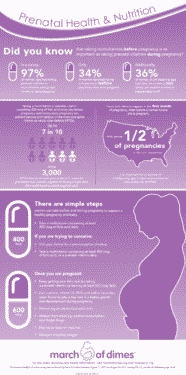Let’s play a game of word association. I say, “prenatal vitamins,” and some of you may say … let me guess, “horse pills”? Yes, prenatal vitamins may be large, but they’re packed with an abundance of nutrients that are essential for prenatal health. And it’s important to start taking them even before you get pregnant.
Prenatal vitamins were introduced in the 1970s, when some supplement companies began to add folic acid to their vitamins. The idea caught on, especially by the 1980s, when research looked at the correlation between folic acid and a developing fetus. While many women have given birth to healthy babies without prenatal vitamins, research shows that taking a prenatal vitamin daily greatly decreases the chance of having a baby with birth defects and/or developmental delays.
What are prenatal vitamins?
Prenatal vitamins are supercharged with daily vitamins, minerals and essential fatty acids to aid in fulfilling the dietary requirements of a pregnant woman and her growing baby.
In comparison to a typical multivitamin, prenatal vitamins contain folic acid, iron and other key nutrients in higher amounts, all of which aid in a baby’s development and growth. Folic acid, a key ingredient, helps in the prevention of major birth defects of brain and spine development, known as neural tube defects.
While a healthy, balanced diet is important during pregnancy, prenatal vitamins can fill in the gaps with necessary nutrients that a woman may be lacking — which is key, since morning sickness, food aversions, upset stomachs and food cravings during pregnancy can lead to vitamin and mineral deficiencies.
What’s in a prenatal vitamin?
Here is a basic rundown of some important ingredients in prenatal vitamins:
- Vitamin B9 or folic acid: Vitamin B9 can be included as either folate (a naturally occurring, bioavailable form of vitamin B9) or, more commonly, as folic acid (a synthetic form of B9). It helps support healthy brain and spine development of the baby.
- Iron: Helps both mom and baby create hemoglobin, the protein in blood that transports oxygen. This is especially important to help prevent anemia (iron deficiency).
- Calcium: Helps build baby’s bones and helps support mom’s bones.
- Vitamin D: Helps with bone health and calcium absorption. Also helps support immune system function.
- Iodine: Helps support mom’s thyroid gland function and baby’s thyroid gland and brain development
- Omega-3 fatty acids (DHA & EPA): Helps with baby’s brain and retina development. However, omega-3 fatty acids are not always included in prenatal vitamins, in which case an omega-3 supplement should be taken for a more comprehensive prenatal regimen.
- Vitamin A: Helps with baby’s growth and organ development. Also helps build baby’s immune system and promotes healthy eyes and skin.
- B complex: While folic acid (B9) is the leader of the bunch, the other B-complex vitamins to note are thiamine (B1), riboflavin (B2), niacin (B3), pantothenic acid (B5), pyridoxine (B6), biotin (B7) and cobalamin (B12). They are all essential during pregnancy, as they help support the healthy development of baby and support mom’s health, energy and may relieve some pregnancy symptoms.
- Vitamin C & E: Aside from supporting a healthy immune system, these antioxidants build collagen (structural protein in skin, bone, tendons and cartilage) in both mom and baby. Vitamin C helps iron absorption.
- Magnesium, sodium, potassium: These electrolytes help maintain hydration, which is important during pregnancy. Electrolytes are also crucial in muscle contractions and nerve impulse transmissions. Magnesium also aids in baby’s development (teeth and bones). Adequate magnesium can also aid in preventing premature uterine contractions.
- Zinc: Helps immune function in mom and aids with the rapid cell growth that occurs during pregnancy.
- Copper: Helps with red blood cell formation. Also aids in baby’s growth and development.
- Choline bitartrate: Helps with baby’s brain and spinal cord development.
When should you begin taking a prenatal vitamin?
While it’s important to take prenatal vitamins during pregnancy, it’s also important for women of childbearing age to take multivitamins prior to pregnancy.
While 97% of women age 18 to 45 who have been or are currently pregnant report taking prenatal vitamins or multivitamins during their pregnancy, only 34% of white women, 27% of Hispanic women and 10% of African-American women say they started taking the vitamins before they knew they were pregnant, according to an online survey conducted by The Harris Poll on behalf of March of Dimes. The survey also found that 36% of women of childbearing age said they currently are not taking any vitamin or mineral supplements at all.

Since almost half of U.S. pregnancies are unplanned — and many women don’t know they are pregnant until around week four to seven — these statistics are concerning. Birth defects most commonly occur during the first three months, as the baby’s organs are forming.
While many factors — genetics, environmental factors, smoking, drinking — can contribute to the development of birth defects, moms-to-be can take additional steps to increase their chances of a healthy baby. That’s why physicians say it’s important to begin a multivitamin or prenatal vitamin with at least 400 mcg of folic acid if you’re considering pregnancy. Once pregnant or actively trying to conceive, that can be bumped up to 600 mcg, or as otherwise recommended by your physician.
“If you are a women of reproductive age, if you’re planning pregnancy, or at least considering it, taking a prenatal vitamin or at least a multivitamin, is a reasonable approach, along with healthy eating, exercise, maintaining a normal weight, avoiding smoking and adhering to these really important things when it comes to health in general,” says Shelly Tien, MD, a maternal-fetal medicine specialist at NorthShore University HealthSystem.
It’s best to have a discussion with your physician to ensure that you are taking the correct dosages of key vitamins and minerals, as there are special scenarios. Those with a history of iron deficiency anemia may be prescribed additional iron supplementation. Women who’ve had a previous baby born with a neural tube defect may need to take more folic acid.
“Women who have a previous history of a neural tube defect should have higher levels of preconception folic acid, typically 4,000 mcg or 4 mg daily,” Tien says. “The reason that preconception [folic acid] is important is that the neural tube closes about 28 days after conception, and most women don’t realize that they are pregnant 28 days after conception.”
How to choose a prenatal vitamin
With so many brands of prenatal vitamins on the market, the choice of which one to choose is most often based on personal preference, as most provide good coverage of the necessary vitamins and minerals.
Look at the ingredient list, delivery method (tablet, capsules, gummies, chewables, powder or liquid), dosing routine (one pill vs. two, once a day or twice a day), cost and if it contains preservatives and artificial colors or flavors.
Everyone is different in their response to taking supplements or medications, and prenatal vitamins are no exception to this. Prenatal vitamins can sometimes exacerbate GI disturbances, so take them with meals. Drinking plenty of water, taking fiber or taking a stool softener (if recommended by your physician) can be beneficial to counteract the constipating effect iron has on bowel movements.
Prenatal vitamins are often larger than average vitamins, and many women experience difficulty swallowing them. Luckily, there are now other options to switch to, including gummy vitamins and liquids.
How long should you take a prenatal vitamin?
Women should ideally begin taking prenatal vitamins before conception and throughout their entire pregnancy. Post-pregnancy, women are encouraged to continue taking their prenatal vitamins, especially if they are breastfeeding. Once a woman stops breastfeeding, or if she opted not to breastfeed, she can switch to a standard adult multivitamin.
Remember, prenatal vitamins serve as a supplement and should not be depended on to cover all your dietary nutrient needs during pregnancy. A healthy, well-balanced diet in combination with prenatal vitamins is the best way to ensure that you get all your necessary daily vitamins, minerals and omega-3 fatty acids. As with any over-the-counter dietary supplement or medication, choosing a prenatal vitamin is a discussion to be had with your physician.










